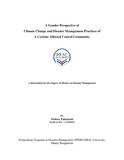A gender perspective of climate change and disaster management practices of a cyclone affected coastal community
Abstract
Men and women are, of course, not homogenous groups, and their experiences, lifestyles, and
geographic and socioeconomic conditions shape their worldviews and proclivities; cognizance
of these types of tendencies can be powerful knowledge when innovating solutions. Climate
change is a threat that is both globally dispersed and intensely localized. It is a global
challenge that burdens all of humanity, but not equally. The world’s poor, the majority of
whom are women, are encumbered disproportionately. In 2009, the United Nations
Population Fund took a deep look at the relationship between women and climate change in
its annual report, concluding that women “are among the most vulnerable to climate change,
partly because in many countries, they make up the larger share of the agricultural work force
and partly because they tend to have access to fewer income-earning opportunities.”
Moreover, the brunt of housework and family-care often falls on women, limiting their ability
to quickly adapt to extreme and sudden weather-related disasters — statistically, the report
said, natural disasters tend to kill more women than men. The distinct impacts of climate
change on men and women are exacerbated in settings that are also affected by violent
conflict, political instability, and economic strife. As the world struggles to grapple with rapid
onset disasters as well as respond to slower degradation caused by climate change, it is
critical to ensure that the plight of women is firmly on the agenda of concerns, and that
women – from different backgrounds – are able to lead in negotiations and participate in the
design and implementation of programs.
Climate change efforts provide an important opportunity to engage women as active agents of
resilience building rather than passive recipients of adaptation support. Women are disproportionately
vulnerable to the impacts of extreme events, and this must be addressed when
supporting communities’ ability to adapt. Perhaps more importantly, however, climate
change provides an opportunity for positive social transformation on gender equity. This
research addresses the vital role of Women empowerment for building Climate resilient
communities with the help of a case study carried out in a coastal village in Bangladesh

